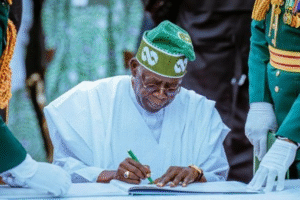Tinubu: A Pencil in the Hand of the Divine

By Tayo Omotayo
There is something about the man called Bola Ahmed Tinubu something that defies logic and transcends politics. His story, so simple on the surface, is anything but ordinary. It is the very definition of providence.
They say his mother was once a house help in the home of Abibatu Mogaji, a woman of influence in Lagos. The story goes that this woman, hailing from Iragbiji, became pregnant by a man from the Tinubu clan a man who denied responsibility. Perhaps this is true. Perhaps not. But one thing is certain: Tinubu was not born into privilege.
He was not the son of Awolowo, nor was he among the groomed elite of Yoruba political aristocracy. Instead, he clawed his way up from the streets of Lagos Island from obscurity to affluence, and from affluence to power.
Before politics, Tinubu made his mark in the corporate world, building a fortune on merit rather than patronage. When he entered politics, it was not as a careerist or opportunist, but as a financier of democratic ideals. His first political outing, as Senator, saw him secure the highest number of votes in the entire country. A rare feat, even among giants.
Then came June 12 — the moment when democracy called for sacrifice. While some, like Mr. Peter Obi, were enriching themselves under military patronage, Tinubu was on the frontlines of resistance. He was jailed. His house was bombed. He fled with his wife, Remi, on a motorcycle across the Nigerian border into exile. There, he did not rest. Instead, he mobilised resources, led strategy, and funded the resistance that ultimately birthed this democracy.
Yes, Tinubu is flawed, as all men are. But his courage is uncommon. He stood against Abacha when doing so could cost a man everything. He stood against Obasanjo when federal might was turned against Lagos. He risked the collapse of his government and yet Lagos flourished under his leadership.
How did he do it? How does one rise despite internal betrayals, religious prejudice, and systemic sabotage?
Even within his own party, the betrayals were biblical. The very government he helped create weaponised policies to derail his presidential ambition. The Buhari administration, with its poorly timed currency redesign and the return of fuel queues, sowed chaos in what seemed like a deliberate attempt to turn the masses against the APC.
Then came the religious hypocrisy. Tinubu was branded “the Muslim candidate,” even as his wife is a Pentecostal pastor and his children practice Christianity. Yet pastors turned their pulpits into political battlegrounds against him. Some mosques followed suit. Northern politicians who once denied him the vice presidency because of his faith returned with the same excuse: “He is not Muslim enough.”
Yet he endured.
Afenifere, the Yoruba socio-political group, historically tribal in its loyalty, broke tradition and backed a rival ethnic candidate. The opposition he faced from within was more vicious than what came from outside. And yet, he won. Somehow, Tinubu always emerges victorious.
Why does he draw such envy? Some ask: “Who is he? Where was he when we stood with Awolowo?” They ask these questions because Tinubu does not fit the mold. He is not a legacy child. He is a self-made phenomenon.
But His ways are not our ways.
If your Father is God, you need not descend from political royalty.
Tinubu may appear ordinary. But he is no ordinary man. He is a pencil in the hand of the Creator, boldly sketching a new narrative for Nigeria.
Nigeria’s road to greatness is not a straight path. But in Tinubu, we may just have found a man audacious enough, strategic enough, and resilient enough to lead us through it.
It can only be God.







